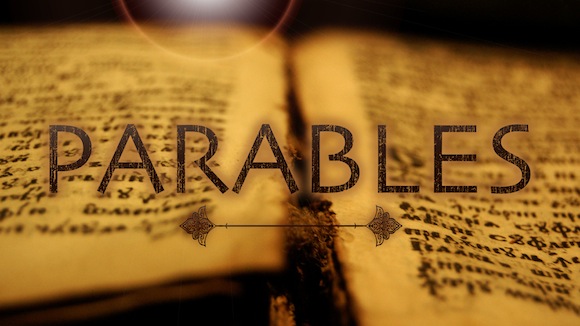I’ve heard that people who are learning a foreign language sometimes dream in that language. I’d love to claim that last night I dreamed (dreamt?) in the language of parables, but sadly my three hours of fitful sleep were spent dreaming of the process of interpreting parables. Just in case, you weren’t aware, there is a rather lengthy procedure one uses in seminary to interpret the teachings of Jesus. At Asbury Theological Seminary we call this scholarly process Inductive Bible Study.
So what is a parable anyway? A parable is…
noun 1.
a short allegorical story designed to illustrate or teach some truth, religious principle, or moral lesson.
2.
a statement or comment that conveys a meaning indirectly by the use of comparison, analogy, or the like.
So to dig a bit deeper an allegory is…
1.a representation of an abstract or spiritual meaning through concrete or material forms; figurative treatment of one subject under the guise of another.
31 He put before them another parable: “The kingdom of heaven is like a mustard seed that someone took and sowed in his field; 32 it is the smallest of all the seeds, but when it has grown it is the greatest of shrubs and becomes a tree, so that the birds of the air come and make nests in its branches.” (NRSV)
Seems pretty simple, right? Obviously, the mustard seed is small, and the tree is big. Jesus is saying the kingdom of heaven will start small and end up big. Correct? Well only partially correct! That answer isn’t good enough for us Biblical Scholars (Ha! Never thought I would say that about myself). You see I have to show evidence proving that is what Jesus meant, and that is where you quickly go down the rabbit hole. This is like when you were back in school and had a math problem, you couldn’t just write the answer, you had to show your work.
Here’s where it gets complicated. Depending on which version of the Bible you are reviewing these two lines of text are written in different ways. Some translations call that shrub a “garden plant,” some call it a “herb.” Then we have to look at the historical background. Did you know that people of the time might have viewed Jesus’s illustration of the mustard seed becoming a tree as a joke? Turns out the tallest one’s mustard plants only get to about 6 feet. Then we have to look at where different items contained in these two lines are used elsewhere in the Bible. Did you know that the “birds of the air” was most likely a reference to a dream that a king named Nebuchadnezzer had hundreds of years earlier, and that dream was detailed in the Old Testament in Daniel Chapter 4? Here’s the text…
The tree grew great and strong,
its top reached to heaven,
and it was visible to the ends of the whole earth.
12 Its foliage was beautiful,
its fruit abundant,
and it provided food for all.
The animals of the field found shade under it,
the birds of the air nested in its branches,
and from it all living beings were fed.
Have I put you to sleep or made your brain hurt?
Well, interpreting those seven assigned parables is what I attempted to do for the past week. The assignment is due this evening at 11:55 pm, so far I’ve spent at least 30 hours on it and only have 3 of the seven complete. Supposedly we should only need to spend 12-15 hours a week on our assignment.
Oh did I forget to mention that we should also be creating a diagram for the parable that details our findings? Here… have a look at one of them I created (though all seven look very different)…
Well, I’ve probably spent long enough whining about how long it takes to interpret parables… time I should have spent…interpreting parables. It’s really kind of shocking to think that as complicated as all of this sounds, it’s just an introductory class to Inductive Bible Study.
I hope my comments don’t come across as being ungrateful for this incredible opportunity. Despite this class’s challenges, it is proving to be one of my favorites. While it is amazing how the Bible read just as it is communicates God’s teachings effectively, it is even more amazing how deep and rich those teachings are if you start delving into the full measure of what (and how) he is communicating them.
The message is overwhelmingly simple.
God loves you.
17 The Lord, your God, is in your midst,
a warrior who gives victory;
he will rejoice over you with gladness,
he will renew you[a] in his love;
he will exult over you with loud singing. (Zephaniah 3:17, NRSV)
-Amen

